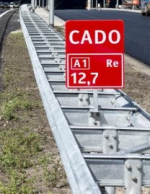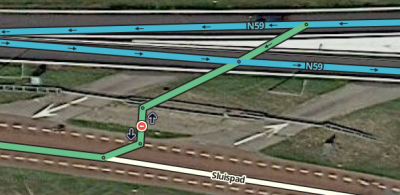Geen bewerkingssamenvatting |
Geen bewerkingssamenvatting |
||
| Regel 10: | Regel 10: | ||
Some CADO's are mapped. These are mostly lanes that can be opened for the public in case of an accident blocking the regular road. An example on the N59, Ooltgensplaat. The closed segment is tilted to prevent the closure to be applied to one of Google Maps nearby segments. | Some CADO's are mapped. These are mostly lanes that can be opened for the public in case of an accident blocking the regular road. An example on the N59, Ooltgensplaat. The closed segment is tilted to prevent the closure to be applied to one of Google Maps nearby segments. | ||
[[File:Cado-ooltgensplaat.png|400px|left|CADO Ooltgensplaat]] | [[File:Cado-ooltgensplaat.png|400px|left|CADO Ooltgensplaat]] | ||
</translate> | |||
{{Clear}} | {{Clear}} | ||
__NOTOC__ | __NOTOC__ | ||
{{Bottomline}} | {{Bottomline}} | ||
Versie van 8 aug 2018 20:49
CADO

In the Netherlands we have the phenomenon CADO, which stands for Calamiteiten doorsteek .
Pass throughs that can be opened to emergency services.
As a general rule: CADO's are not mapped. The exceptions that are mapped are protected by long lasting closures.
Some CADO's are mapped. These are mostly lanes that can be opened for the public in case of an accident blocking the regular road. An example on the N59, Ooltgensplaat. The closed segment is tilted to prevent the closure to be applied to one of Google Maps nearby segments.
